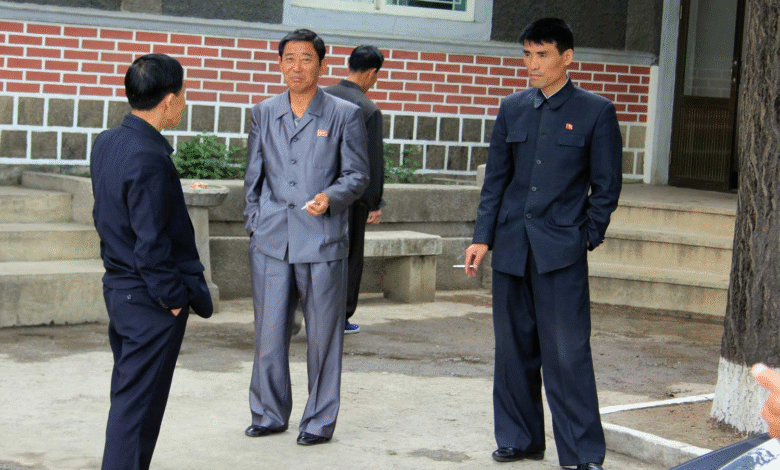North Korea Smuggling Case: Chinese National Sentenced to Prison

The recent North Korea smuggling case has raised alarming concerns regarding illegal arms smuggling and the activities of foreign nationals in the United States. A Chinese citizen was sentenced to eight years in prison for conspiring to traffick unauthorized firearms and sensitive technology to North Korea, an act that implicates significant breaches of international law and U.S. security protocols. The U.S. Department of Justice reported that Shenghua Wen, who pleaded guilty earlier this year, was involved in a complex scheme that included hiding weapons within shipments falsely declared as consumer goods. This scandal not only strains China North Korea relations but also highlights the escalating risks associated with gun trafficking across borders. The implications of such actions underline a pressing need for increased vigilance against the backdrop of international conspiracies, especially those that threaten democracy and safety.
At the heart of the North Korea smuggling case lies a troubling narrative of cross-border conspiracy involving illicit arms and technological transfers. The incident underscores the intricate web of illegal operations orchestrated by individuals seeking to exploit global supply chains for nefarious purposes. Recently, a Chinese national was found guilty of a serious offense that encompasses not just gun trafficking but also violations of international economic statutes. This case illustrates the precarious nature of relations between nations and the lengths to which some may go to procure materials for militaristic intentions. As such, it emphasizes the critical role of law enforcement and diplomatic channels in curtailing such destructive practices.
Overview of the North Korea Smuggling Case
The recent case involving a Chinese national, Shenghua Wen, has brought to light serious allegations of illegal arms smuggling to North Korea. The U.S. Department of Justice confirmed that Wen was sentenced to eight years in prison for conspiring to transport firearms and sensitive technology illegally. This situation underscores the complex web of international relations and the ongoing challenges faced by authorities in combating illicit gun trafficking.
Wen’s case highlights the significant risks associated with illegal dealings, particularly in relation to North Korea. The charges not only involve smuggling guns but also include the violation of the International Emergency Economic Powers Act. Such offenses can have far-reaching implications, prompting scrutiny over China North Korea relations and allying the interests of the U.S. government to enforce stricter measures against such conspiracies.
The Implications of Illegal Arms Smuggling
Illegal arms smuggling represents a grave threat to global security, particularly when it involves nations like North Korea. The ramifications extend beyond just the illicit trade itself; they affect diplomatic relationships and heighten tensions across regions. The U.S. Department of Justice’s efforts to clamp down on gun trafficking highlights the urgency with which authorities are treating such cases, as they seek to prevent military supplies from bolstering the capabilities of rogue states.
Furthermore, with increasing enforcement from various nations, the penalties for engaging in these activities have become substantially severe. In Wen’s case, despite receiving an eight-year prison sentence for his actions, the law under which he was convicted allows for much harsher penalties, with a maximum sentence of 20 years looming over such conspiracies. This penal framework aims to deter future illegal arms smuggling and sends a decisive message against those considering similar ventures.
The Role of China North Korea Relations in Smuggling Operations
The relationship between China and North Korea complicates efforts to prevent illegal arms smuggling, as reported in Wen’s case. Wen was instructed by North Korean officials to procure and smuggle goods, revealing the extent of international collusion in illicit arms trade. This connection not only raises questions about regional security but also invites scrutiny into how such relations might facilitate future smuggling operations.
As China maintains a significant degree of political and economic support for North Korea, the challenge of regulating illegal arms transactions becomes even more daunting. Agencies like the U.S. Department of Justice are increasingly aware that dismantling smuggling networks requires clear intelligence and cooperative international strategies. Thus, addressing these issues is pivotal in reinforcing global norms against arms proliferation and mitigating risks associated with unauthorised military enhancements.
The Impact of Federal Law on Arms Trafficking
Federal laws such as the International Emergency Economic Powers Act are crucial in prosecuting individuals involved in arms trafficking. In the case of Shenghua Wen, his actions were classified as a breach of this act, leading to his conviction. This legal framework empowers U.S. authorities to take decisive action against those attempting to illegally export sensitive materials that threaten national and international security.
Moreover, these laws establish stringent guidelines for the consequences faced by those engaged in illegal traffickers. With charges that can lead to decades of incarceration, potential offenders are significantly deterred by the severe repercussions. This reinforces the commitment of federal institutions to uphold national security while emphasizing the importance of stringent compliance with international arms regulations.
Preventing Future Smuggling Cases
The convictions in cases like that of Shenghua Wen are steps toward preventing future illegal arms smuggling incidents. Increased vigilance at ports and enhanced collaboration with international law enforcement agencies play significant roles in thwarting illegal operations. The DOJ’s continued emphasis on dismantling such smuggling networks illustrates a robust approach to ensuring global security against rogue threats.
In addition, fostering awareness about the consequences of illegal arms trade is vital in dissuading individuals from engaging in smuggling activities. Educational campaigns highlighting the risks and penalties associated with these crimes can further strengthen preventive measures. Ultimately, a multi-faceted strategy, involving legislation, enforcement, and public education, is essential for addressing and eliminating the scourge of illegal arms trafficking effectively.
Technological Enhancements in Smuggling Detection
The smuggling of arms and sensitive technology, as demonstrated in the case of Shenghua Wen, has prompted advancements in detection technology by federal agencies. During a search at Wen’s residence, authorities uncovered various devices intended for clandestine purposes, illustrating the sophistication of modern smuggling efforts. As criminals continue to develop highly effective methods, law enforcement must also enhance their capacity to detect and counter these strategies.
Innovations in surveillance and detection technology play a critical role in identifying potential threats before they escalate. The use of chemical threat identification devices and electronic eavesdropping detectors proves vital in rooting out networks involved in illegal arms trading. As technological limitations are surpassed, the prospect of thwarting illegal shipments will improve significantly, shielding both national and global security from the ramifications of illegal arms smuggling.
International Cooperation Against Arms Trafficking
International collaboration is paramount when addressing the complex issue of arms trafficking. Efforts such as intelligence sharing among countries can bolster the fight against the illicit smuggling of arms to nations like North Korea. The recent case of Shenghua Wen serves as a reminder that such illegal operations often span multiple borders, necessitating coordinated action from various governments.
Additionally, multinational treaties dedicated to arms control and trafficking prevention can provide frameworks for joint enforcement actions and policy development. This could not only help close legal loopholes but also enable a unified response to emerging threats from illegal arms smuggling which can destabilize regions and embolden aggressive state behavior.
The Importance of Legal Representation in Smuggling Cases
In cases involving illegal arms smuggling, the role of legal representation cannot be understated. Shenghua Wen had attorneys from the Federal Public Defenders Office during his trial, illustrating how access to competent legal counsel is crucial, even in serious federal offenses. Legal representation ensures that defendants are thoroughly informed of their rights and the intricacies of the law, which can influence case outcomes significantly.
Moreover, having skilled attorneys in such cases can lead to negotiated pleas or sentence reductions, as seen with Wen’s eight-year prison term. Legal advocacy plays a key role in upholding the justice system’s integrity, ensuring fairness, and preventing abuses that could arise from prosecutorial overreach against individuals accused of serious crimes like arms smuggling.
Future Trends in Arms Smuggling Enforcement
As illegal arms smuggling continues to evolve, enforcement strategies must also adapt to effectively combat these changing dynamics. Enhanced training for border security, customs officials, and law enforcement agencies are vital to recognizing and responding to sophisticated smuggling techniques. The growing influence of technology in this realm necessitates updates to training programs that can keep pace with current threats.
Additionally, the integration of data analytics and intelligence tracking can aid in predicting and preventing illegal arms trafficking activities. By understanding patterns and trends through data analysis, authorities can implement preemptive measures to intercept illegal shipments. Future enforcement efforts must emphasize proactive approaches, pooling resources and expertise across jurisdictions to combat the pressing issue of global arms smuggling.
Frequently Asked Questions
What was the outcome of the North Korea smuggling case involving Shenghua Wen?
In the North Korea smuggling case, Chinese national Shenghua Wen was sentenced to eight years in prison for conspiring to illegally smuggle guns, ammunition, and sensitive U.S. technology to North Korea. The U.S. Department of Justice announced his sentencing after he pleaded guilty to violating the International Emergency Economic Powers Act.
How did Shenghua Wen facilitate illegal arms smuggling to North Korea?
Shenghua Wen facilitated illegal arms smuggling by hiding firearms and ammunition inside shipping containers that he falsely labeled as consumer goods intended for China. He admitted to having North Korean officials fund approximately $2 million to assist him in procuring these illegal items, as detailed in the North Korea smuggling case.
What charges did the U.S. Department of Justice bring against Shenghua Wen?
The U.S. Department of Justice charged Shenghua Wen with conspiracy to violate the International Emergency Economic Powers Act and acting as an illegal agent of a foreign government, in connection with his North Korea smuggling activities.
What can be expected from the sentences in North Korea smuggling cases?
Sentences in North Korea smuggling cases can be severe, as seen with Shenghua Wen, who received eight years in prison. The maximum penalty for conspiracy to smuggle weapons, as outlined in Wen’s case, can reach up to 20 years in prison based on the seriousness of the charges.
What incriminating evidence was found during the investigation of the North Korea smuggling case?
During the investigation of the North Korea smuggling case, federal agents discovered a ‘chemical threat identification device’ and a device for detecting eavesdropping in Shenghua Wen’s home. Additionally, 50,000 rounds of 9mm ammunition were confiscated from his vehicle, all meant for North Korea.
What role do China-North Korea relations play in illegal arms smuggling cases?
China-North Korea relations are often central to illegal arms smuggling cases, like that of Shenghua Wen, as Chinese nationals may exploit their proximity and connections to facilitate the illegal transfer of arms and technology to North Korea. These relations can complicate enforcement and regulatory measures.
How did the U.S. government respond to the illegal arms smuggling incident involving Shenghua Wen?
The U.S. government responded to the illegal arms smuggling incident by investigating Shenghua Wen’s activities, ultimately leading to charges and a guilty plea before his sentencing. The U.S. Department of Justice took a firm stance against the smuggling of arms to North Korea, showcasing their commitment to enforcing international laws.
What implications does the North Korea smuggling case have on U.S. national security?
The North Korea smuggling case raises significant implications for U.S. national security, as illegal arms transfers can enhance North Korea’s military capabilities, posing threats not only in the region but globally. The case highlights the need for stringent measures against such illegal activities.
How can individuals be implicated in North Korea smuggling schemes?
Individuals can be implicated in North Korea smuggling schemes through direct involvement in the procurement, transport, or sale of illegal arms, as evidenced by Shenghua Wen’s actions. Engagement with North Korean officials or facilitation of funding for such activities can also lead to severe legal consequences.
| Key Point | Details |
|---|---|
| Defendant’s Identity | Shenghua Wen, a 42-year-old Chinese national. |
| Charges | Conspiring to smuggle guns, ammunition, and sensitive U.S. technology to North Korea. |
| Sentence | Eight years in prison. |
| Illegal Activities | Hiding contraband in shipping containers and falsely labeling their contents. |
| Financial Involvement | Received approximately $2 million from North Korean officials for procurement activities. |
| Previous Meetings | Met with North Korean officials before entering the U.S. |
| Seized Items | Items confiscated include a ‘chemical threat identification device’ and 50,000 rounds of 9mm ammunition. |
| Current Status | Held in federal custody since arrest in early December. |
Summary
The North Korea smuggling case involving Shenghua Wen highlights the serious implications of illegal arms trading and technology transfer to hostile nations. Wen’s actions pose a significant threat to U.S. national security and demonstrate the complexities of international espionage and crime. With the sentencing of eight years, this case serves as a reminder of the legal consequences of engaging in such illicit activities.




